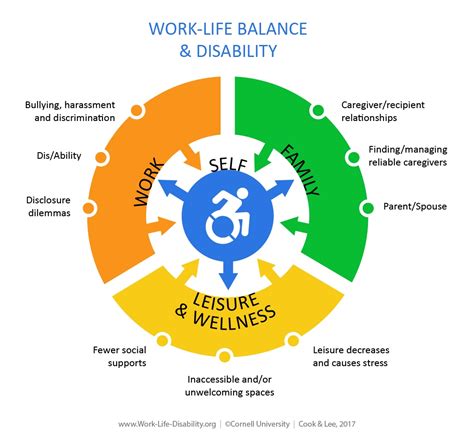Finding Balance: Work, Disability, & Your Time
Juggling work and life is a challenge for everyone, but for individuals with disabilities, it can present a unique set of hurdles. Finding the right balance requires careful planning, self-advocacy, and a willingness to adapt. This article explores the complexities of managing work, disability, and personal time, offering strategies and insights to help you navigate this journey.
What are the biggest challenges in balancing work, disability, and personal time?
This is a crucial question, and the answer varies widely depending on the individual's specific disability and workplace environment. Common challenges include:
- Managing fluctuating energy levels: Many disabilities involve periods of high and low energy, making consistent work productivity difficult. Planning tasks around energy peaks and incorporating rest periods is essential.
- Accessibility limitations: Physical or cognitive accessibility challenges at the workplace can significantly impact productivity and well-being. This may include issues with building access, technology, or workspace adjustments.
- Stigma and discrimination: Unfortunately, prejudice and misunderstanding regarding disability can create stressful work environments and limit opportunities. Open communication and advocacy can help mitigate this.
- Time management difficulties: Cognitive impairments, chronic pain, or other disability-related symptoms can make managing time and prioritizing tasks more challenging. Effective time management techniques and assistive technologies can be beneficial.
- Mental health: The added stress of managing a disability alongside work responsibilities can negatively affect mental well-being. Prioritizing self-care, seeking support, and practicing stress-reduction techniques is vital.
How can I better manage my time when dealing with a disability?
Effective time management is crucial for balancing work, disability, and personal life. Consider these strategies:
- Prioritize tasks: Identify the most crucial tasks and focus on those first when your energy levels are highest.
- Break down large tasks: Divide large projects into smaller, more manageable steps to avoid feeling overwhelmed.
- Use a planner or calendar: Schedule work tasks, appointments, and personal time to maintain a clear overview of your day and week. Consider digital calendars with reminder features or specialized apps for task management.
- Set realistic goals: Don't try to do too much at once. Set achievable goals that fit your energy levels and capabilities.
- Learn to say no: Don't overcommit yourself. It's okay to decline requests that will cause undue stress or strain.
- Delegate tasks: If possible, delegate tasks at work or at home to share the workload.
What workplace accommodations can I request to help me manage my disability?
The Americans with Disabilities Act (ADA) protects individuals with disabilities from discrimination in the workplace and mandates reasonable accommodations. These accommodations can significantly improve productivity and well-being. Examples include:
- Flexible work arrangements: This could involve telecommuting, flexible hours, or compressed workweeks.
- Assistive technology: This may include screen readers, voice recognition software, or ergonomic equipment.
- Modified workspaces: Adjustments to the physical workspace, such as adjustable desks, specialized chairs, or ramps, can enhance accessibility.
- Modified job duties: Adjustments to job responsibilities to better suit your capabilities.
- Extra breaks or reduced work hours: Allowing for periods of rest can be vital for managing fluctuating energy levels.
How can I advocate for myself at work while managing my disability?
Self-advocacy is crucial for securing necessary accommodations and support. Consider these steps:
- Document your needs: Keep records of medical diagnoses, treatment plans, and any limitations related to your disability.
- Communicate openly and honestly: Talk to your supervisor or HR department about your needs and the accommodations you require.
- Be prepared to discuss solutions: Offer suggestions for reasonable accommodations that will help you succeed in your role.
- Know your rights: Familiarize yourself with the ADA and relevant employment laws in your area.
- Seek support: Talk to family, friends, support groups, or disability advocates for guidance and encouragement.
How can I prioritize self-care when balancing work and disability?
Self-care is not a luxury but a necessity, especially when managing a disability alongside work responsibilities. Prioritize these activities:
- Sufficient sleep: Aim for 7-9 hours of quality sleep each night.
- Healthy diet: Eat nutritious foods to support your physical and mental well-being.
- Regular exercise: Engage in physical activity that is safe and enjoyable for you.
- Stress reduction techniques: Practice relaxation techniques like deep breathing, meditation, or yoga.
- Social connection: Maintain strong social connections with family and friends.
- Seek professional help: Don't hesitate to seek therapy or counseling if you are struggling to cope with stress or other challenges.
Finding balance between work, disability, and personal time is an ongoing process. It requires patience, self-compassion, and a commitment to advocating for your needs. By implementing the strategies discussed in this article, you can create a more sustainable and fulfilling life. Remember, you are not alone, and support is available.

